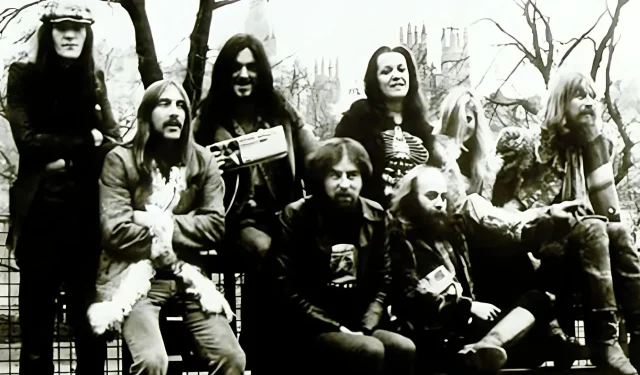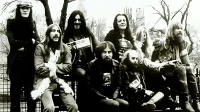Black Sabbath is often heralded as the quintessential creator of heavy metal music, alongside bands like Deep Purple and Led Zeppelin. However, during the same period, several other groups were fusing elements of blues, garage rock, and psychedelia with darker themes, thus taking the “Flower Power”movement into a heavier realm. These trailblazing acts have since been classified as “proto-metal”in contemporary discussions about the music genre.
The origin of the term “heavy metal”itself is somewhat enigmatic. The phrase first appeared in the literary realm through William S. Burroughs’ character “Uranian Willy the Heavy Metal Kid” from his 1961 novel The Soft Machine. This unique phrase likely permeated the vocabulary of the counterculture, particularly among hipsters and thinkers of that time.
The phrase got its first lyrical mention in 1967 with Steppenwolf’s classic “Born to Be Wild,”famously featuring the line “heavy metal thunder.” By 1970, music critics were starting to use the term in their reviews. Influential writers like Lester Bangs and “Metal Mike” Saunders employed the term, although initially, it often carried a derogatory connotation. Interestingly, some bands, such as Judas Priest, decided to embrace the label as a point of pride, ultimately helping to shape the genre’s identity.
1 Blue Cheer
Debut Album: Vincebus Erputum (1968)
https://www.youtube.com/watch?v=as1NcX31szs
Blue Cheer stormed onto the music scene in 1968 with a sound described as “an angry fist of sludge and feedback,” electrifying audiences of the era. Their debut album, Vincebus Erputum, featured a rendition of Eddie Cochran’s “Summertime Blues,” climbing to number 14 on the Billboard Hot 100 chart. This exposure allowed them to perform on shows like American Bandstand and Beat Club.
Following their impactful debut, Blue Cheer recorded their second album, Outsideinside, at New York Harbor, as their intensity was deemed too overwhelming for traditional studios. Unfortunately, the band’s rapid rise was marred by drug issues and lineup changes, leading to their disbandment by 1971.
2 Budgie
Debut Album: Budgie (1971)
Budgie, the Welsh trio comprised of Burke Shelley (vocals and bass), Tony Bourge (guitar and vocals), and Ray Phillips (drums), formed in 1967 and released their debut in 1971. Though they didn’t achieve the same commercial success as some of their contemporaries, Budgie cultivated a loyal fan base and were celebrated at the 1982 Reading Festival. Their 1974 album, In For The Kill, featured “Crash Course in Brain Surgery,” a track later covered by Metallica in 1987.
In recent years, Budgie has garnered newfound appreciation for their substantial impact on heavy metal legends like Iron Maiden and Megadeth. As noted by a contestant on BangerTV’s Metalheads trivia show, “Budgie is one of my favorite bands of all time, and they never get the credit they deserve.”
3 Sir Lord Baltimore
Debut Album: Kingdom Come (1970)
Established in 1968, Sir Lord Baltimore featured Brooklyn natives drummer John Garner and guitarist Louise Dambra, later enlisting bassist Gary Justin. The band attracted attention with their seminal 1970 debut, Kingdom Come, which some have cited as the first instance of “heavy metal”in a musical context. Critically, Mike Saunders remarked that they had mastered nearly every convention of heavy metal.
Despite their forward-thinking sound, the band disbanded in the mid-1970s due to poor sales, substance abuse, and internal conflicts, leaving behind a legacy that would influence countless acts to follow.
4 Josefus
Debut Album: Get Off My Case (1969)
From Texas, Josefus made a notable mark on the heavy music scene, particularly with their second album, Dead Man, released in 1970. The album’s blend of heavy blues and psychedelic rock, combined with its raw production quality, left an indelible influence on later musicians, including Dave Wyndorf of Monster Magnet, who honored the band with a cover during their 2021 celebration.
Josefus originally formed in the late ’60s, featuring vocalist Pete Bailey, guitarist Dave Mitchell, bassist Ray Turner, and drummer Doug Tull. Although they disbanded in 1970, their influence persisted throughout the decades, albeit with intermittent reunions. The recent passing of Pete Bailey in 2024 marked a poignant chapter in their history.
5 Coven
Debut Album: Witchcraft Destroys Minds & Reaps Souls (1969)
Coven emerged as one of America’s earliest occult rock bands with their debut album, Witchcraft Destroys Minds & Reaps Souls. Lead singer Jinx Dawson captured dark themes in her lyrics, exploring the supernatural in a unique musical context that melded acid rock with psychedelic elements. However, following an unfortunate association with Charles Manson, their album was pulled from shelves amidst the “Satanic Panic,”turning it into a prized collector’s item.
Despite a temporary disbandment in the mid-’70s, Jinx reformed Coven years later, continuing their darkly enchanting legacy.
6 Hawkwind
Debut Album: Hawkwind (1970)
Widely recognized as the precursor to Motorhead’s Lemmy Kilmister, Hawkwind has built an impressive catalog since their formation in 1969. The band is credited with pioneering “space rock,”a genre characterized by its eclectic mix of cosmic sounds and high-energy performances. Their 1971 album, In Search Of Space, featured the lengthy track “You Shouldn’t Do That,”praised for its raw energy and visionary approach to sound.
Hawkwind’s experimental sound has impacted multiple music genres, inspiring future artists to push musical boundaries.
7 Mountain
Debut Album: Climbing! (1970)
Often miscategorized as a “one-hit wonder,”Mountain was pivotal in bridging the gap between the psychedelic sounds of the 1960s and the heavier rock of the 1970s. Their defining moment came at the legendary Woodstock festival, where the band’s intense performance showcased their powerful sound. Leslie West’s guitar work left a lasting impression, even influencing future guitar icons like Randy Rhoads.
8 Uriah Heep
Debut album:. ..Very ‘Eavy. ..Very ‘Umble (1970)
Named after a character from Charles Dickens’ David Copperfield, Uriah Heep formed in 1969 and their debut album showcased a blend of progressive rock and blues, establishing a formula that would come to define heavy metal. Despite polarizing reception, with critics expressing skepticism towards their sound, Uriah Heep’s influence endures in the metal scene today.
Notably, their legacy lives on in cultural references like the film This Is Spinal Tap, adding to their historical footprint.
9 Dust
Debut Album: Dust (1971)
Dust, formed by a group of Brooklyn teenagers in 1969, made an impactful entry into the heavy music scene with their groundbreaking sound characterized by powerful guitar work and intense rhythms. Their first album gained recognition for its blues-heavy themes, and their follow-up, Hard Attack, featured eye-catching artwork from famed illustrator Frank Frazetta.
Though they ultimately disbanded due to label issues, both Richie Wise and Marc Bell (later Marky Ramone of The Ramones) went on to have successful careers in music.
10 Pentagram
Debut Single: Hurricane (1973)
https://www.youtube.com/watch?v=dl1-Pi9DfuU
Pentagram’s journey in the music world exemplifies the phrase “better late than never.” Their sudden rise to fame came in 2025 when a clip of their lead singer Bobby Liebling performing went viral, captivating new audiences. This resurgence coincided with the release of their album Lightning In A Bottle, which received critical acclaim as an exemplary doom metal record.
Despite their tumultuous past, filled with personal challenges, it seems that Pentagram is finally getting the recognition they deserve.


